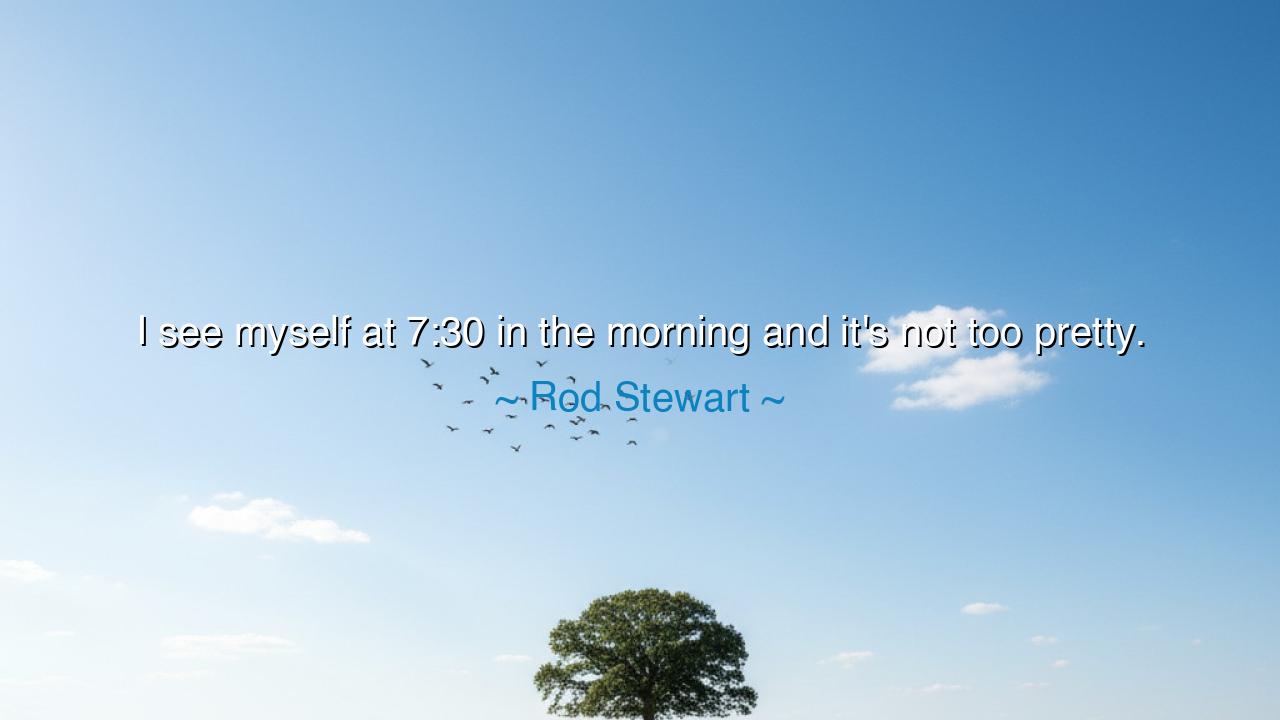
I see myself at 7:30 in the morning and it's not too pretty.






Hear the candid words of Rod Stewart, the singer whose voice carried across generations: “I see myself at 7:30 in the morning and it’s not too pretty.” At first, his words sound lighthearted, a jest about the face in the mirror. Yet beneath the humor lies a truth that all mortals must face—that time humbles beauty, that the dawn is unkind to vanity, and that honesty about one’s imperfections is a deeper form of grace than any illusion of perfection.
When Stewart speaks of 7:30 in the morning, he invokes not only an hour, but the symbolic threshold between night and day, between dream and waking. In the morning light, there are no stage lights, no costumes, no illusions—only the raw, unfiltered self. It is here, stripped of glamour, that truth is seen most clearly. To say it is “not too pretty” is to admit that the world of appearances fades with the rising sun, and that what remains is the humbler reality of flesh and bone.
Yet this humility is not despair. Rather, it is liberation. Stewart, a man long admired for charisma and image, confesses that even he cannot escape the ordinary truth of aging and imperfection. In this way, he stands with the rest of humanity, reminding us that the pursuit of eternal beauty is folly, and that laughter at one’s flaws is wiser than denial. His humor softens the sting of truth, showing that self-acceptance is more powerful than self-deception.
History shows us this same lesson. Marcus Aurelius, emperor and philosopher, often wrote in his Meditations about the frailty of the human form. He reminded himself daily that behind the purple robes and titles, he was but dust and spirit, subject to decay like all others. Or consider Socrates, who was said to be homely in face but radiant in wisdom. These men, like Stewart, understood that to acknowledge imperfection is to rise above it. The truly great are those who need not cling to illusions, for they have embraced truth.
The deeper meaning of Stewart’s words is that the mirror of the morning reveals more than the body—it reveals the soul’s relationship with itself. To look upon one’s reflection and laugh rather than weep is an act of strength. For no man or woman escapes the toll of time, but those who meet it with humility and humor live more freely than those who rage against the inevitable. The beauty of the spirit will always outlast the beauty of the skin.
The lesson for us is clear: embrace the truth of yourself, even when it is “not too pretty.” Do not hide from the imperfections that the morning light exposes, for they are the marks of your humanity, your journey, your survival. The world may honor beauty for a season, but character, kindness, and honesty are eternal. It is better to laugh at the face of time than to tremble before it.
The practical action is this: each morning, when you stand before your mirror, do not seek perfection. Instead, seek gratitude. See the lines not as flaws, but as the writing of life upon your body. See the tired eyes as proof that you have lived and labored. And if you find yourself laughing at the sight, know that laughter itself is a shield of strength. In doing so, you will learn to love the truth of your reflection, not the illusion.
Thus, Rod Stewart’s words endure not as vanity, but as wisdom cloaked in jest. He teaches that to face oneself at 7:30 in the morning—without glamour, without disguise—and to smile at what is seen, is one of life’s greatest victories. For beauty fades, but honesty, humor, and self-acceptance remain, shining brighter than any spotlight.






AAdministratorAdministrator
Welcome, honored guests. Please leave a comment, we will respond soon